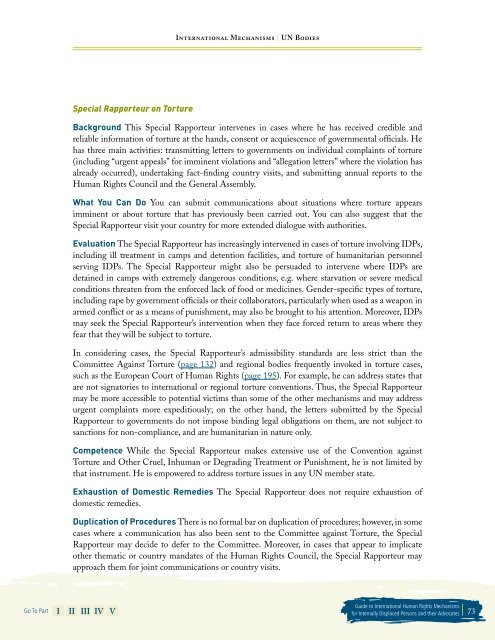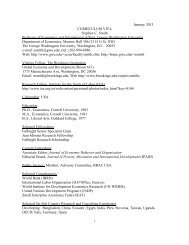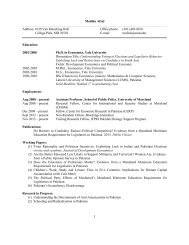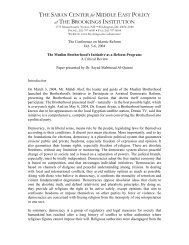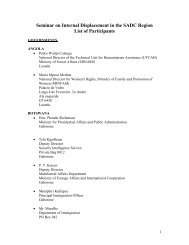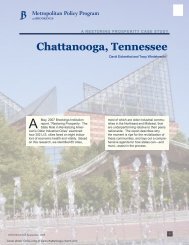Guide to International Human Rights Mechanisms - Brookings
Guide to International Human Rights Mechanisms - Brookings
Guide to International Human Rights Mechanisms - Brookings
You also want an ePaper? Increase the reach of your titles
YUMPU automatically turns print PDFs into web optimized ePapers that Google loves.
Go To Part I II III IV V<br />
Special Rapporteur on Torture<br />
<strong>International</strong> <strong>Mechanisms</strong> | UN Bodies<br />
Background This Special Rapporteur intervenes in cases where he has received credible and<br />
reliable information of <strong>to</strong>rture at the hands, consent or acquiescence of governmental officials. He<br />
has three main activities: transmitting letters <strong>to</strong> governments on individual complaints of <strong>to</strong>rture<br />
(including “urgent appeals” for imminent violations and “allegation letters” where the violation has<br />
already occurred), undertaking fact-finding country visits, and submitting annual reports <strong>to</strong> the<br />
<strong>Human</strong> <strong>Rights</strong> Council and the General Assembly.<br />
What you can Do You can submit communications about situations where <strong>to</strong>rture appears<br />
imminent or about <strong>to</strong>rture that has previously been carried out. You can also suggest that the<br />
Special Rapporteur visit your country for more extended dialogue with authorities.<br />
evaluation The Special Rapporteur has increasingly intervened in cases of <strong>to</strong>rture involving IDPs,<br />
including ill treatment in camps and detention facilities, and <strong>to</strong>rture of humanitarian personnel<br />
serving IDPs. The Special Rapporteur might also be persuaded <strong>to</strong> intervene where IDPs are<br />
detained in camps with extremely dangerous conditions, e.g. where starvation or severe medical<br />
conditions threaten from the enforced lack of food or medicines. Gender-specific types of <strong>to</strong>rture,<br />
including rape by government officials or their collabora<strong>to</strong>rs, particularly when used as a weapon in<br />
armed conflict or as a means of punishment, may also be brought <strong>to</strong> his attention. Moreover, IDPs<br />
may seek the Special Rapporteur’s intervention when they face forced return <strong>to</strong> areas where they<br />
fear that they will be subject <strong>to</strong> <strong>to</strong>rture.<br />
In considering cases, the Special Rapporteur’s admissibility standards are less strict than the<br />
Committee Against Torture (page 132) and regional bodies frequently invoked in <strong>to</strong>rture cases,<br />
such as the European Court of <strong>Human</strong> <strong>Rights</strong> (page 195). For example, he can address states that<br />
are not signa<strong>to</strong>ries <strong>to</strong> international or regional <strong>to</strong>rture conventions. Thus, the Special Rapporteur<br />
may be more accessible <strong>to</strong> potential victims than some of the other mechanisms and may address<br />
urgent complaints more expeditiously; on the other hand, the letters submitted by the Special<br />
Rapporteur <strong>to</strong> governments do not impose binding legal obligations on them, are not subject <strong>to</strong><br />
sanctions for non-compliance, and are humanitarian in nature only.<br />
competence While the Special Rapporteur makes extensive use of the Convention against<br />
Torture and Other Cruel, Inhuman or Degrading Treatment or Punishment, he is not limited by<br />
that instrument. He is empowered <strong>to</strong> address <strong>to</strong>rture issues in any UN member state.<br />
exhaustion of Domestic remedies The Special Rapporteur does not require exhaustion of<br />
domestic remedies.<br />
Duplication of Procedures There is no formal bar on duplication of procedures; however, in some<br />
cases where a communication has also been sent <strong>to</strong> the Committee against Torture, the Special<br />
Rapporteur may decide <strong>to</strong> defer <strong>to</strong> the Committee. Moreover, in cases that appear <strong>to</strong> implicate<br />
other thematic or country mandates of the <strong>Human</strong> <strong>Rights</strong> Council, the Special Rapporteur may<br />
approach them for joint communications or country visits.<br />
<strong>Guide</strong> <strong>to</strong> <strong>International</strong> <strong>Human</strong> <strong>Rights</strong> <strong>Mechanisms</strong><br />
for Internally Displaced Persons and their Advocates


